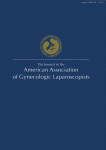Endometrial Na+, K+-ATPase pump function and vasopressin levels during hysteroscopic surgery in patients pretreated with GnRH agonist.
Study Objective. To investigate the effects of gonadotropin-releasing hormone (GnRH) analog pretreatment on endometrial Na+, K+-adenosine triphosphatase (ATPase) pump function and peripheral blood vasopressin levels, and their role in fluid absorption and mechanisms of hyponatremia in patients undergoing hysteroscopic endometrial ablation.
Design. Prospective, randomized, placebo-controlled study (Canadian Task Force classification I).
Setting. University-affiliated hospital.
Patients. Seventeen women with dysfunctional uterine bleeding.
Intervention. Nine women received a GnRH analog and eight received saline approximately 6 to 8 weeks before hysteroscopic ablation by electrosurgery.
Measurements and Main Results. Both before randomization and immediately before surgery, endometrial biopsy samples were obtained and numbered consecutively without patient identification. Operative hysteroscopy was performed with glycine 1.5% mixed with 2% alcohol. The amount of irrigant and irrigant deficit; blood levels of albumin and ethanol; hematocrit and hemoglobin; changes in sodium levels; and central venous pressure were compared. The Na+, K+-ATPase pump activity was significantly increased in the GnRH analog group compared with the saline group and correlated with decreased estradiol levels (0.4±0.08 vs 0.26±0.06 μmol/min/ml). Vasopressin levels were significantly lower in the GnRH group (3.2±0.9 vs 7.6±1.7 μmol/L). Mean volume of irrigant used and operating time were similar in both groups. Volume deficit, decrease in protein, and hematocrit

